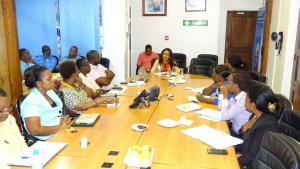Better value, better health: Value for money (Vfm) briefing for WCO staff in Tanzania
Dar es Salaam, 31 October 2018: In its 13th General Programme of Work (GPW13), the World Health Organization is setting forth an ambitious agenda with measurable goals and a strategy to bring the world on track to achieve the health-related Sustainable Development Goals. To meet the SDG goals WHO will do all it can to support countries. This is what the GPW13 is about.
As part of the implementation of WHO’s Value for Money (Vfm) framework, WHO management organized a targeted VfM workshop/training course for selected programme staff from each of the six WHO regions and WHO/HQ. Purpose of the training was to create a pool of VfM champions as resource persons for the rest of the organization. The training took place in Amman, Jordan in the third week of October 2018. Dr Ritha Njau, NPO/Malaria was selected by WHO/AFRO as one of the champions of the Trainer of Trainers for WHO.
Following the training, the Country Office organized a briefing session for staff as part of change management. The meeting was opened by Dr. Adiele Onyeze who gave brief remarks on the importance of the current reforms taking place in the organization. He stressed that Value for Money is an approach which WHO has chosen in order to increase the transparency and accountability of the organization.
Dr. Njau then presented an overview of Vfm and what it means for the organization. She stressed that this is embedded in the GPW 13 where the thrust in reaching the triple billions is on outcomes and impact rather than inputs and outputs. The Value for money approach will enable the organization to realize this impact on all our operations from 2019.
She outlined that Vfm was not new in the corporate world and many bilateral organizations were using it. She also highlighted how DfId had embarked on it for many years. She highlighted that there is a framework that has been produced by the Executive Board 142/7 that expounds VfM as part of the reform process in the organization. The recently endorsed Investment Case for WHO also stresses the VfM approach in all aspects of our programme cycle. In summary, her presentation covered the following:
- The GPW13 explicitly states WHO’s renewed focus on impact, moving beyond a focus on process and outputs.
- For WHO VfM is about how an organization achieves results to provide for optimal deployment of effort and resources. Its definition includes 5 dimensions: Economy, Efficiency, Effectiveness, Equity, and Ethics.
- WHO intends to address VfM at 3 complementary levels: global strategic priority-setting; programme design and implementation with a focus at country level; and, leadership and enabling functions.
- WHO has developed an implementation plan with 5 strategic objectives, key activities and measures of success, including for emergency programmes in the EMRO region.
- Significant progress has been achieved so far, including an Investment Case, VFM reporting templates, staff training, communications material.
The presentation was followed by discussions moderated by the WR, Dr. Tigest Ketsela.
A thorough training would follow once the VfM champions have finalized an approved implementation plan for training colleagues in all the countries. Dr. Tigest thanked Dr. Njau for her presentation and all staff who were able to attend the briefing session. She mentioned that this is a new way of working and each one should look forward to learning more during the forthcoming training sessions.



